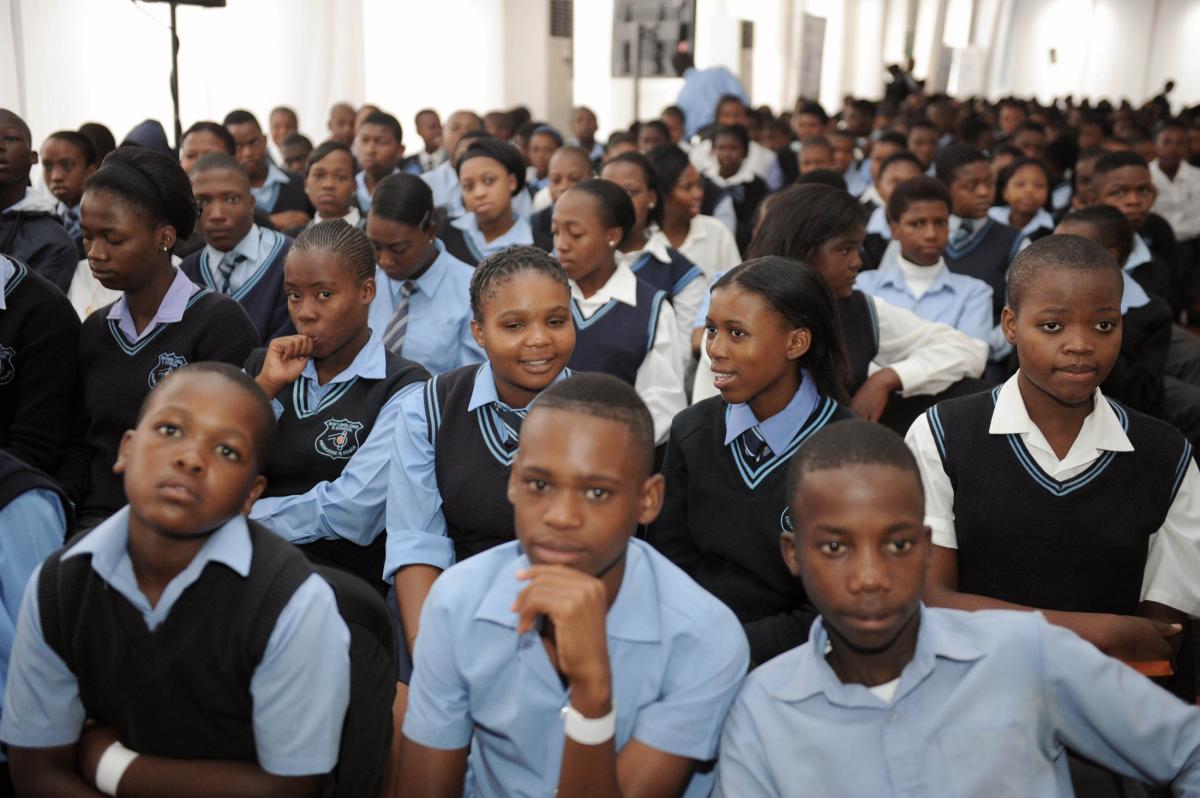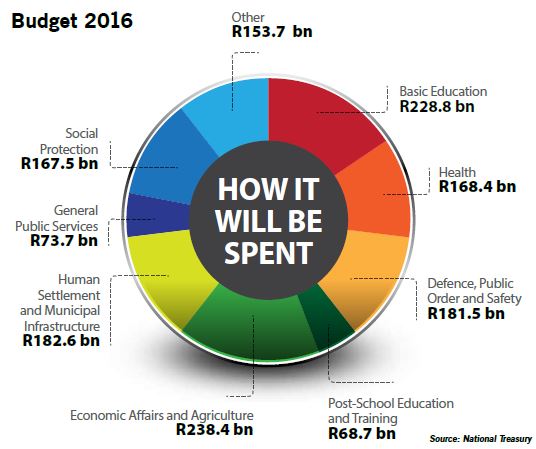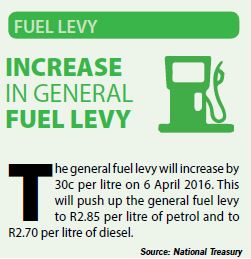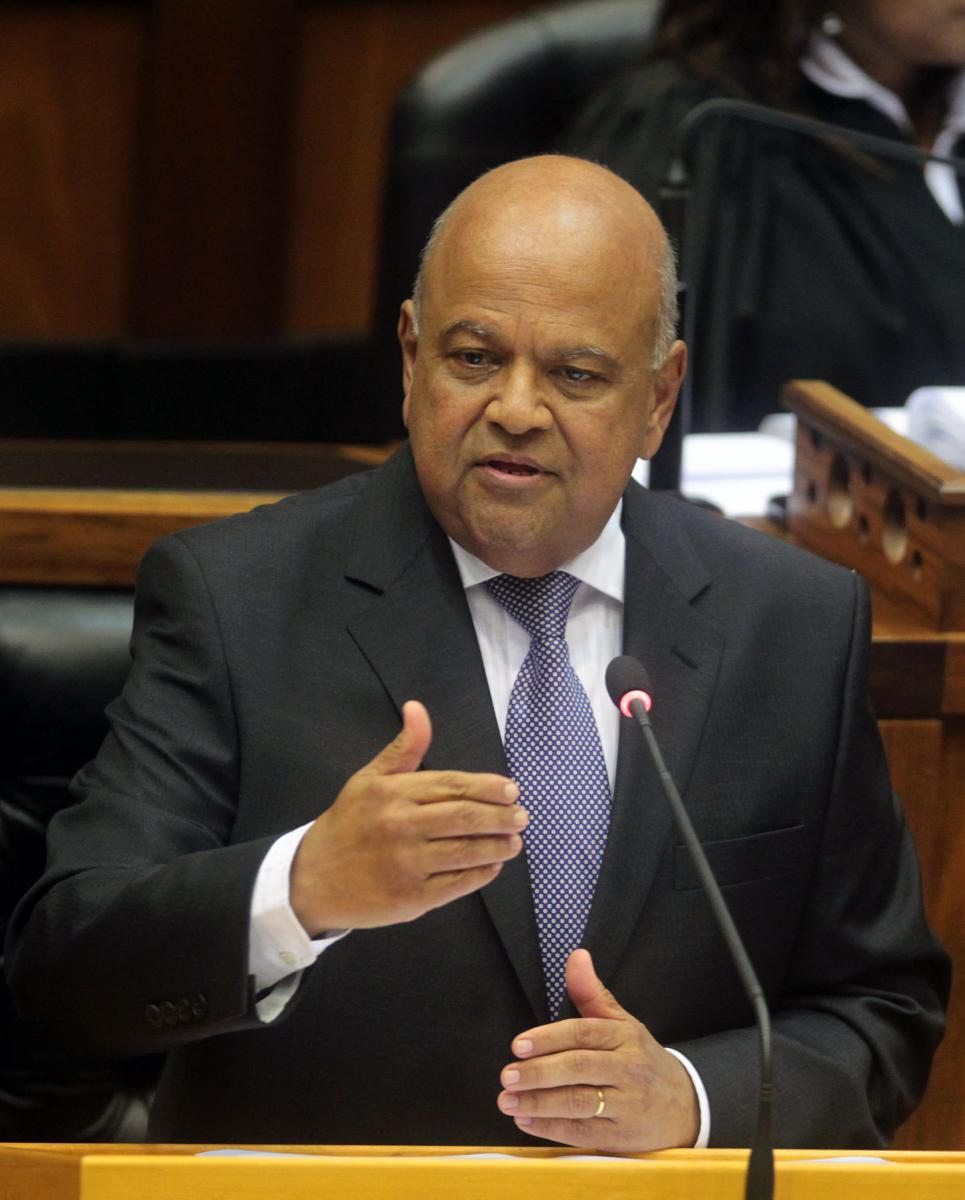As the global and local economy faces challenging times, Finance Minister Pravin Gordhan has cautioned South Africans to tighten their belts and work together.
Delivering his Budget Speech recently, Minister Gordhan announced measures that aim to put the country’s economy on the right path. These measures include clamping down on government spending by freezing new appointments in the public sector. Along with other measures, this will help government save R25 billion in spending over the next three years.
Government also plans to raise R18 billion more in taxes in 2016/17, partly through a slight increase in personal income tax, which will be felt mostly by higher earners. However, no cuts have been made in spending on social grants.
Government will also consider closing or merging those state-owned enterprises that fail to perform, said Minister Gordhan.
The measures outlined by the Finance Minister in the Budget come as the economy is expected to grow at just 0.9 percent this year, down from an expected 1.3 percent for 2015.
Minister Gordhan has a tough job in trying to avoid a sovereign ratings downgrade, which will make it more expensive for government to borrow money to finance its deficit.
“We cannot spend money we do not have. We cannot borrow beyond our ability to repay. Until we can ignite growth and generate more revenue, we have to be tough on ourselves,” he stressed.
To do so, the deficit – the difference between government spending and revenue – will be lowered to 3.2 percent of spending in 2016/17, from the 3.9 percent forecast for the 2015/16 year.
Managing government spending
Minister Gordhan said all appointments for vacant government posts (except those for teachers, nurses, doctors, police officers and other critical positions) would be frozen from 1 April. This will help reduce the public sector wage bill by R7.2 billion. Departments will have to justify any new appointments by submitting revised human resource plans.
In addition, new rules will limit what government spends on travel and accommodation (expected to save R1.6 billion over three years), conferences and car purchases for political office bearers.
All suppliers and government departments will also have to use an electronic procurement portal (eTenders portal) from 1 April.This will make procurement more transparent and lower costs for suppliers and the state. By 2018/19 it is expected to save the state
R25 billion a year of its R500 billion procurement spend, through lower advertising and administrative costs.
All companies that wish to do business with government must be registered on the central supplier database from 1 April for transactions with national and provincial government and their entities, and from 1 July for municipalities.
Taxes
Minister Gordhan indicated that government aims to raise taxes by a total of R48 billion over the next three years – R18 billion in 2016/17 and a further R15 billion in each of the two following financial years.
The R18 billion in tax increases in 2016/17 will help to fill the gap left by the government missing its tax collections target by R11.6 billion. The increases will partly be achieved through fiscal drag and increases in environmental taxes and the fuel levy.
Fiscal drag is what happens when inflation bumps some tax payers to a higher tax bracket, resulting in them having to pay more in tax. To avoid this, National Treasury usually adjusts the tax brackets every year.
Duties on cigarettes and drink, however will be raised by between six and
8.5 percent, while the fuel levy will go up 30c and transfer duties on properties above
R10 million increases from 11 percent to
13 percent.
In addition the tyre levy, to finance recycling programmes, will be raised as will levies on incandescent light bulbs (from R4 to R6), plastic bags (6c to 8c) and vehicle emissions.
Minister Gordhan has also proposed a tax on fizzy drinks effective from April 2017.
Tackling drought
Minister Gordhan said over the next three years R1.1 billion will be reprioritised to
tackle the drought, through interventions such as drilling boreholes, distributing animal feed, moving cattle herds and transporting potable water to hard-hit areas.
The state will also invest R865 billion in infrastructure projects over the next three years.
Investing in cities
The Minister also highlighted the number of projects taking place in cities across the country aimed at reshaping transport systems in these areas. Bus Rapid Transit systems are operational and expanding in Johannesburg, Tshwane, Cape Town and George, and will be extended to Ekurhuleni and eThekwini this year.

“About R6 billion is allocated to this programme in 2016/17. Improvements to rail rolling stock and infrastructure will begin to improve the daily travel experience for commuters,” he said.
Over 90 integrated land development projects valued at more than R130 billion are in progress:
- In eThekwini, the Cornubia node comprises 25 000 housing units. An inner city regeneration programme is also underway, including projects at Bridge City, Centrum, the Point and the interconnecting corridor.
- In the Tembisa Corridor, in Ekurhuleni, R6.5 billion in public investment will leverage R8 billion in private sector investment to deliver housing, commercial and office facilities.
- In Cape Town, the N2 Gateway housing programme as well as the redevelopment of the Voortrekker Road Corridor, Conradie Hospital, the Athlone Power Station and other sites.
- In Tshwane, investments are focused on the Mabopane Station Hub, which is the gateway to the north for more than 150 000 passengers a day and has an informal market accommodating approximately 2 500 traders.
- In Manguang, the R2.6 billion mixed-use Airport Development Node is in construction. An inner city residential development is planned and the Vista Park and Brandkop projects will yield over 8 500 housing units at a total development cost of over R1.9 billion.
- In Johannesburg, the “Corridors of Freedom” connecting Soweto, Alexandra, Sandton and the Johannesburg CDB bring together public transport improvements, social amenities and partnerships with property developers to increase settlement densities and improve social mobility.
Increase in social spending
Despite the tighter times, spending on social grants will increase by R11.5 billion over the next three years, reaching R165 billion in 2018/19. State old-age and disability grants will increase from R1 415 to R1 505, while grants for war veterans and people over 75 years increase from R1 435 to R1 525. Foster-care grants rise to R890 and child-support grants from R330 to R350.
In addition, R4.5 billion has been allocated to the National Health Insurance (NHI) over the next three years. Government is currently implementing NHI at 390 sites.
A further R984 million has also been added to expand coverage of HIV and AIDS treatment and prevention, with R740 million for the treatment of tuberculosis. An additional R475 million has been allocated to the Department of Small Business Development over the next three years.
Following government’s agreement to meet demands from students to not increase students' fees this year, R16.3 billion has been allocated to higher education.
An additional allocation of R813 million for Early Childhood Development (ECD) is proposed to increase the number of children in ECD centres by 104 000 over the next three years.
Encouraging South Africans to save
To encourage more South Africans to save, National Treasury last year introduced tax-free savings accounts. These allow one to get tax-free savings of up to R30 000 a year.
Minister Gordhan said so far about 150 000 accounts have been opened, with savings totalling R1 billion.
In February, Cabinet announced it would postpone the annuitisation requirement for provident fund members for two years to allow for further consultation with key stakeholders.
Minister Gordhan, however, said the tax benefits will continue to be implemented from 1 March for all retirement fund contributions, including for provident funds. These include a higher tax deduction for of 27.5 per cent for amounts of up to R350 000 a year contributed to pension, provident and retirement annuity funds.




 Facebook
Facebook Twitter
Twitter WhatsApp
WhatsApp